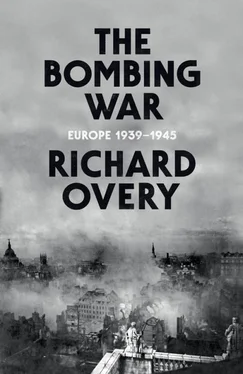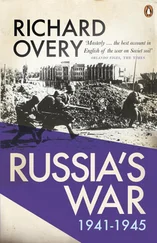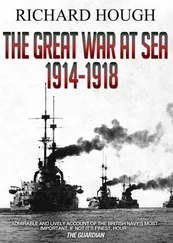Richard Overy
London, January 2013
Prologue
Bombing Bulgaria
The modern aerial bomb, with its distinctive elongated shape, stabilizing fins and nose-fitted detonator, is a Bulgarian invention. In the Balkan War of 1912, waged by Bulgaria, Greece, Serbia and Montenegro (the Balkan League) against Turkey, a Bulgarian army captain, Simeon Petrov, adapted and enlarged a number of grenades for use from an aeroplane. They were dropped on a Turkish railway station on 16 October 1912 from an Albatros F.2 biplane piloted by Radul Milkov. Petrov afterwards modified the design by adding a stabilized tail and a fuse designed to detonate on impact, and the 6-kg bomb became the standard Bulgarian issue until 1918. The plans of the so-called ‘Chataldzha’ bomb were later passed on to Germany, Bulgaria’s ally during the First World War. The design, or something like it, soon became standard issue in all the world’s first air forces.
Petrov’s invention came back to haunt Bulgaria during the Second World War. On 14 November 1943 a force of 91 American B-25 Mitchell bombers escorted by 49 P-38 Lightning fighters attacked the marshalling yards in the Bulgarian capital, Sofia. The bombing was spread over a wide area, including three villages. The raid destroyed some of the rail system, the Vrajedna airfield and a further 187 buildings, resulting in around 150 casualties. A second attack 10 days later by B-24 Liberator bombers was less successful. There was poor weather across southern Bulgaria and only 17 of the force reached what they hoped was Sofia and bombed through cloud, hitting another seven villages around the capital. 1The attacks were enough to spread panic through the city. In the absence of effective air defences or civil defence measures, thousands fled to the surrounding area. The Royal Bulgarian Air Force, though equipped with 16 Messerschmitt Me109G fighters supplied by Bulgaria’s German ally, could do little against raids which, though not entirely unexpected, came as a complete surprise when they happened. 2
The raid in November 1943 was not the first attack on a Bulgarian target during the war, though it was the heaviest and most destructive so far. Bulgaria became a target only because of the decision taken in March 1941 by the Bulgarian government, after much hesitation, to tie the country to Germany by signing the Tri-Partite Pact, which had been made between the principal Axis powers, Germany, Italy and Japan, the previous September. 3When in spring 1941 German forces were based in Bulgaria to attack Greece and Yugoslavia, the RAF sent a force of six Wellington bombers to bomb the Sofia rail links in order to hamper the concentration of German troops. A British night raid on 13 April made a lucky hit on an ammunition train, causing major fires and widespread destruction. Further small raids occurred on 23 July and 11 August 1941, which the Bulgarian government blamed on the Soviet air force. Although Bulgaria did not actively participate in the Axis invasion of the Soviet Union on 22 June 1941, it gave supplies to Germany and allowed German ships to use the major ports of Varna and Burgas. On 13 September 1942 a further small Soviet raid hit Burgas where German ships, laden with oil-drilling equipment, were awaiting the signal to cross the Black Sea to supply German engineers with the materials they would need to restart production once the Caucasus oilfield had been captured. The Soviet Union was not at war with Bulgaria and denied the intrusions in 1941 and in 1942, for which it was almost certainly responsible, but the attacks were of such small scale that the Bulgarian government did not insist on reparations. 4
The handful of pinprick attacks in 1941 and 1942 were enough to make Bulgaria anxious about what might happen if the Allies ever did decide to bomb its cities heavily. Bulgaria’s position in the Second World War was an ambiguous one. The Tsar, Boris III, did not want his country to be actively engaged in fighting a war after the heavy territorial and financial losses Bulgaria had sustained in the peace settlement of 1919 as a punishment for joining with Germany and Austria-Hungary in the First World War. Only with great reluctance and under German pressure did the prime minister, Bogdan Filov, declare war on Britain and the United States on 13 December 1941. Aware of Bulgaria’s vulnerability, the government and the Tsar wanted to avoid an actual state of belligerence with the Western powers, just as the country had refused to declare war on the Soviet Union. Bulgaria’s small armed forces therefore undertook no operations against the Allies; instead they were used by the Germans as occupation troops in Macedonia and Thrace, territories given to Bulgaria after the German defeat of Yugoslavia and Greece in 1941. By 1943 it was evident to the Bulgarian government and people that they had once again backed the wrong side. Much of the population was anti-German and some of it pro-Soviet. In 1942 a left-wing Fatherland Front had been formed demanding an end to the war and the severing of links with Germany. Partisan movements in the occupied territories and in Bulgaria itself became more active during 1943 and in August that year they launched a major recruitment drive. The partisans were chiefly communist and campaigned not only for an end to the war but for a new social order and closer ties with the Soviet Union. In May 1943 and again in October, Filov authorized contacts with the Western Allies to see whether there was a possibility of reaching an agreement. He was told that only unconditional surrender and the evacuation of the occupied territories could be accepted. 5
It is against this background that sense can be made of the Allied decision to launch a series of heavy air attacks on Bulgarian cities. Knowing that Bulgaria was facing a mounting crisis, caught between its German ally and the growing threat of a likely Soviet victory, Allied leaders were encouraged to use bombing as a political tool in the hope that it might produce a quick dividend by forcing Bulgaria out of the war. The idea that bombing was capable of a sudden decisive blow by demoralizing a population and causing a government crisis had been at the heart of much interwar thinking about the use of air power. It was the logic of the most famous statement of this principle made in 1921 by the Italian general, Giulio Douhet, in his classic study The Command of the Air ( Il dominio dell’aria ). The principle was also a central element in the view of air power held by the British prime minister, Winston Churchill, who had previously applied it to both Germany and Italy. It was not by chance that in a meeting with the British chiefs of staff on 19 October 1943, it was Churchill who should suggest that in his view the Bulgarians were a ‘peccant people to whom a sharp lesson should be administered’. Their fault was to have sided once again with the Germans despite, Churchill claimed, his efforts to get them to see sense. Bombing was designed to undo the cord that bound Bulgaria to her German patron.
The sharp lesson was to be a heavy bombing attack on Sofia. Churchill justified the operation on political grounds: ‘experience shows,’ he told the meeting, ‘that the effect of bombing a country where there were antagonistic elements was not to unite those elements, but rather to increase the anger of the anti-war party’. 6Others present, including Air Chief Marshal Sir Charles Portal, chief of the air staff, and the chief of the general staff, General Alan Brooke, were less keen and insisted that leaflets should be dropped along with the bombs explaining that the Allies wanted Bulgaria to withdraw its occupation troops and surrender (in the end a leaflet was dropped with the curious headline ‘This is not about Allied terror, but about Bulgarian insanity’). 7But the idea of a ‘sharp lesson’ quickly circulated. The American military chiefs thought that Sofia was so low a military priority that an attack was scarcely justified, but they were impressed by the possible ‘great psychological effect’. 8Both the British and American ambassadors in Ankara urged an attack so as to interrupt Turkish-German commercial rail traffic. 9On 24 October the Anglo-American Combined Chiefs of Staff directed General Dwight D. Eisenhower, supreme commander in the Mediterranean, to give such a lesson as soon as this was operationally practical. 10The Turkish government approved, hopeful perhaps despite neutrality to profit from Bulgaria’s discomfiture in any post-war settlement. Churchill wanted Stalin’s say-so as well because Bulgaria was clearly in the Soviet sphere of interest. On 29 October the British Foreign Minister, Anthony Eden, who was in Moscow for negotiations, was able to report back Stalin’s comment that Sofia should certainly be bombed as it was nothing more than ‘a province of Germany’. 11
Читать дальше
Конец ознакомительного отрывка
Купить книгу












